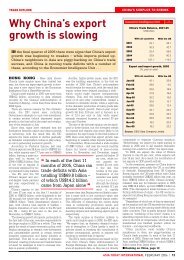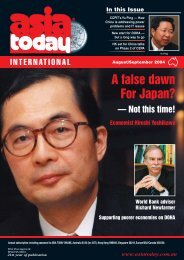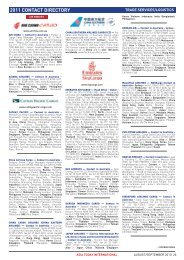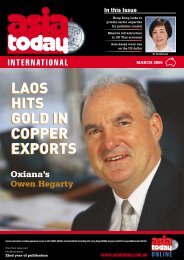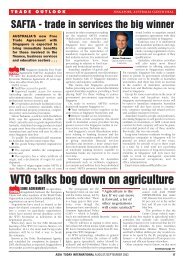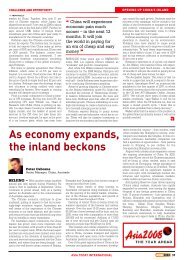indonesia - Asia Today International
indonesia - Asia Today International
indonesia - Asia Today International
You also want an ePaper? Increase the reach of your titles
YUMPU automatically turns print PDFs into web optimized ePapers that Google loves.
THE REGION➔ FROM PAGE 13power generationonly. To defuse tension,France,Germany and the UKmade an agreementin November withIran that it wouldtemporarily freeze itsnuclear enrichmentprogramme in returnfor various economic,technological,political and securitybenefits from theEuropeans.One oil major thatis wary of offendingWashington is BP.The UK group,which has largeupstream and retailinterests in the US asa result of itstakeovers of Arcoand Amoco in thelate 1990s, has clearlydeclared its intentionto stay out ofIran in view of USpolicy. Although BPhas historical tieswith Iran — pioneeringoil production inthe early 20th centuryas the Anglo-<strong>Asia</strong> Pacific Liquefied Natural Gas DemandOutlook (million tones) 1JapanSouth KoreaTaiwanIndiaChinaPhilippinesThailand*Singapore *Hong Kong*Indonesia*New ZealandNorth Americanwest coastTotal2002 2010 201553.0 59.3 61.417.0 23.8 32.95.1 11.1 12.18.1 11.07.7 18.31.0 1.7Yudyono, who has declared restoringIndonesia’s credibility in the eyes of foreigninvestors as one of his main goals.Tangguh, in the Bird’s Head region of westernPapua, will supply initially 7.6 million tonnesof LNG from two trains. Another two trains areplanned longer term. Sales contracts have beensigned for supply to China, South Korea andMexico — where the gas will support powergeneration for both Mexico and California (inthe US).This, along with a supply contract from theShell-operated Sakhalin LNG facility in theRussian Far East, are the first contracts from the<strong>Asia</strong> Pacific for supply to the North AmericanWest Coast, which many see emerging as alarge market rivalling that now in Japan, theworld’s largest consumer of LNG. First shipmentsfrom Tangguh are to be made in 2008.The project’s advance had been delayed bynegotiations between the Tangguh consortiumand the Government over extension ofupstream contracts over three blocks whosefields supply gas for liquefaction. In early Marchthe Government agreed to extend the contractsuntil 2035, thereby providing BP and its partnerswith the long-term certainty they wantedin order to invest forward in the project.The development cost includes upstreamfield and pipelines, liquefaction plant and shipping.BP is the project operator with partnersNippon Oil, Mitsubishi/Inpex, Kanematsu, andLNG Japan (a consortium of Japanese companies),and CNOOC, the Chinese State-controlledpetroleum company. Onshore engineering,procurement and construction will be carriedout by a consortium led by Kellog, Brownand Root, a subsidiary of Halliburton of the US.The Italian company Siapem will build the offshorefacilities.????1.3 2.27.0 10.075.1 119.2 149.71 each million tonnes per year of LNG can fuel 1,000 megawatts of powergeneration capacity* all now studying possible LNG imports after 2010; in Indonesia’s case Javacould take LNG from domestic plants in Kalimantan or Indonesian PapuaSource: Australian Bureau of Agriculture and Resource Economics (Nov2004) and ATI.Persian Oil Co, and then Anglo-Iranian, beforebeing renamed BP — the company says it hasno interest currently in returning.The Chief Executive of BP, Lord Browne,says that “to do business with Iran at themoment would be offensive to the UnitedStates and therefore against BP’s interests.”“We are heavily influenced by our Americanposition,” he adds.BP givesgreen lightfor US$5b.LNG pojectTHE US$5 billion TangguhLNG project in IndonesianPapua is to go ahead, withdeals already signed for gassupply to China, South Koreaand Mexico . . .SINGAPORE — BP and its partnersgave the green light in March for constructionof the US$5 billion Tangguh LNG project inIndonesian Papua.Tangguh is Indonesia‚s largest foreigninvestedproject since the fall of Suharto in1998. BP‚s commitment will be welcomed byIndonesia’s new President, Susiliyo BambangMEETING ASIA’S ENERGY GAPTangguh is BP’s main biggest upstream projectin <strong>Asia</strong> since the completion in Vietnam ofits Nam Con Son gas field, pipeline and powerplant development in 2002, and promises toestablish BP among the main LNG producersfor the <strong>Asia</strong> Pacific market.For Indonesia, currently the world’s largestLNG exporter, Tangguh will make up forsharply-declining production from the AruhLNG plant in Aceh in northern Sumatra, operatedby Indonesia‚s State oil company, Pertamina,Gas fields operated by ExxonMobil are depletingrapidly, and there has been little new explorationbecause of the conflict between Jakartaand Acehnese separatists. Indonesia’s mainLNG plant is the Bontang facility in EastKalimantan, operated by and supplied by gasfields operated by Total and Unocal.Tangguh faces not just technical and commercialchallenges. The development, and thehuge future revenues associated with it, are atthe centre of political relations between Jakartaand Papua. At today’s prices, the sales outputvalue of the first two trains is more than US$2billion a year. Revenue will flow for severaldecades given the size of Tangguh‚s supportinggas reserves.Jakarta is providing more autonomy toPapua, with its predominantly Melanesian population,in order to defuse separatist pressures.As part of this, the bulk of gas revenues are earmarkedfor direct allocation to the local area.Concern remains, though, as to how revenuewill be best managed for the welfare of the noweconomically very poor local communities. BP,while not wanting to play the role of a de factogovernment, is finding there are high expectationsthat it will assist in local development.To demonstrate its efforts in regard to ensuringthat the project’s community impact is beneficialand also that its environmental impact isminimal and acceptable, BP has established anexternal monitoring and advisory panel includinga former Indonesian Ambassador, Sabam❝Tangguh will make upfor sharply-declining productionfrom the AruhLNG plant in Aceh innorthern Sumatra, operatedby Pertamina ❞Siagian, Papua’s Reverend Herman Saud,Senator George Mitchell of the US, and LordHannay of Chiswick in the UK. The panel’sreports and recommendations and BP’sresponses are published on BP’s company website.In this way, BP hopes to avoid problems experiencedin the past by other large resourcesdevelopment projects in Indonesia, such asFreeport’s copper and gold mine in easternPapua, and more recently the Newmont goldmine in Mihahasa, in northern Sulawesi. Theseand others are accused of disregard for theinterests of local peoples — and of badly damagingthe local environment.— Andrew SymonASIA TODAY INTERNATIONAL APRIL 2005 | 15



